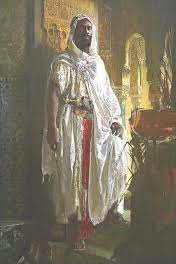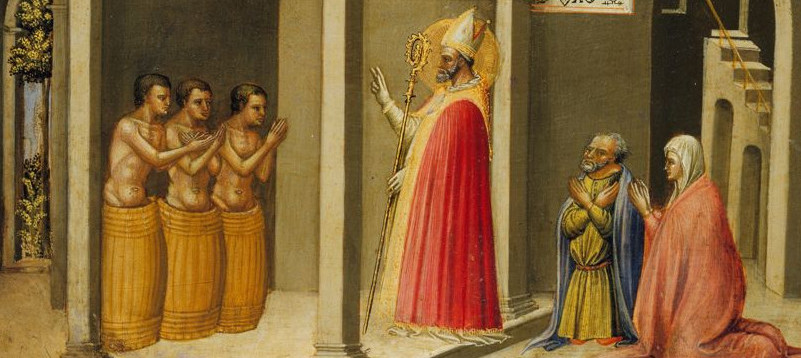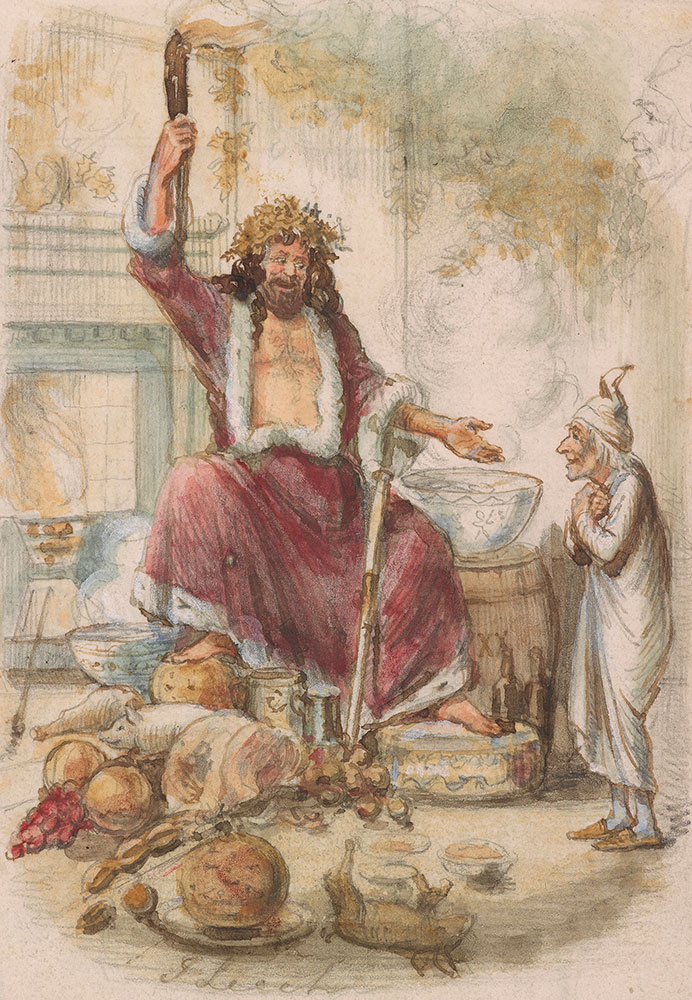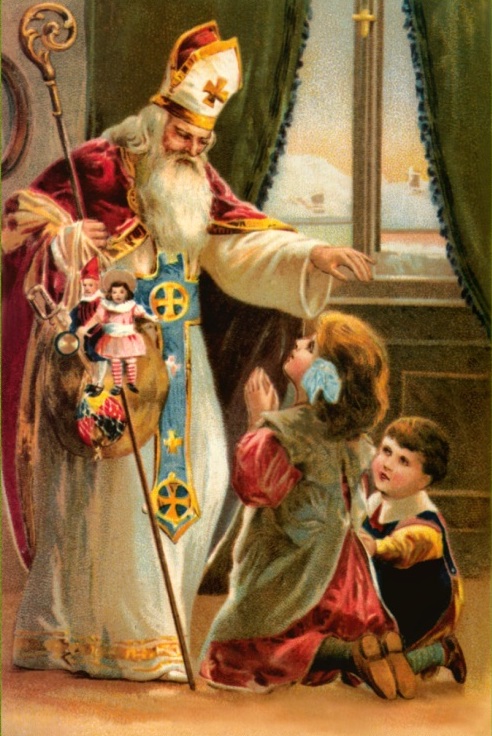
Needless to say, this had a chilling effect on the jolly mood around the breakfast table. Yes, we knew about Sinterklaas and his great bag of gifts, whether it be conveyed by a boat or a sleigh. But bad children going into a bag? This was new.

And the whole multitude sought to touch Him,
for power went out from Him and healed them all.
(Lu 6:19)
In the Name of the Father and of the Son and of the Holy Ghost. Amen.
The decline of religion and the loss of God is reported all around us every day. But what has replaced God .... or, for that matter, goodness? During recent decades, the answer is, "comic books." Go to the movies. Visit streaming websites. You will find that movie studios have defined the transcendent and the supernatural with comic book figures. The theme these movies propose is the superior character of individual differences, whatever they might be, taking their place beside, or even surpassing, the truths revealed on Mount Sinai or the Mount of Beatitudes.
It is no surprise that surly anti-heroes should come to fore. Ambiguity, irony, and shades of gray become new standards for personal conduct, attaining epic status, as a sequence of fifteen Batman films attest generating revenue of 6.7 billion dollars. This is the outcome of "Live and let live" and "Don't judge" culture.
But what of good and evil? we ask. These fall beneath the "complexity" of one's own truth in the anti-hero world. The individual, you see, replaces good and evil. Individuals follow their own code.
As Dr. Fauci sends out a general call for a universal vaccine, so the pop culture on every side exhorts studios, technology giants, and New Age gurus to articulate a universal replacement for God. Even the the problem of death is solved as we hear, "People will soon live forever .... Death is just another disease," destined to be solved with a vaccine.
Before these social changes came into full bloom, my family sponsored a young woman studying at a large public university nearby. She was a shining girl from Flanders in Belgium. She had nothing of American pop culture about her. And she evinced wonderful qualities. She was cheerful, responsible, and mature. Over time, I saw that she exercised superb judgment, both compassionate and just.
When I drove her to the airport a year later, I asked, "What was the best thing about the U.S. and the worst?" "The best thing," she said, "was the openness of the people. It was fresh and large like America's huge, open spaces."
"And the worst?" I asked prodding her a little. She replied in a quiet, reluctant tone, "Oh .... too much liberty. And also, too little clarity" .... you see, that boundaries don't matter; only "my story" matters. "If I could only explain myself, you will see that there really aren't any boundaries." I understood her point. It had to do with a new American imperative: one's "own truth."
Her commitment to good was obvious. And her merry nature and humility obviously arose from her formation in the faith life of her family, who, it turns out, were Roman Catholic.
She sat at the breakfast table on December 5 and announced with a sense of anticipation that the boat carrying St. Nicholas (or Sinterklaas, as they say in Flemish Dutch) had left Spain. He would be arriving to Holland and Flanders the next day. Upon hearing this momentous news, everyone, especially the children, wanted to know more. "Oh yes," she told them. "St. Nicholas is coming with his big crosier and his tall, red hat! And he always brings Zwarte Piet."
"Zwarte Piet?!" we asked. "Who is Zwarte Piet?!"
She told us that he was St. Nicholas' assistant. "In English you would say, 'Black Pete.' St. Nicholas carries a great bag of gifts for good boys and girls. But Zwarte Piet carries a dark bag into which he throws the bad boys and girls."

Needless to say,
this had a chilling effect on the jolly mood around the breakfast table.
Yes,
we knew about Sinterklaas and his great bag of gifts,
whether it be conveyed by a boat or a sleigh.
But bad children going into a bag?
This was new.
Later, that day I pieced it out. They are coming out of Spain because that was the land of the black Moors, like Othello. Zwarte Piet was a Moor, from West Africa originally.
When I lived in Haiti decades later, Black Pete and his bag resurfaced. I learned about dictator, Francois Duvalier. He used this same story to control his people. Duvalier had begun his career as a pediatrician and was beloved as a deliverer, turning back the plague of Yaws, which afflicted children. He also took the lead in implementing programs for sanitary conditions. For these accomplishments, he was crowned with the title "Papa Doc" — a title expressing sincere adoration.
As he rose through various elected offices, he used differences in skin color setting one Haitian against another, fostering hatred of lighter-skin people. To be sure, all Haitians are of West African descent. Indeed, the Haitian constitution declares that white people cannot be Haitian. This is why the national flag of Haiti, modeled on the French flag, has no white stripe. But any differences in skin shade was sufficient to achieve his aims.
In 1959 he strengthened his hold over the Haitian imagination by introducing his assistant, "Zwarte Piet" or, in the Haitian version, "Tonton Macoute" (literally, "Uncle Gunnysack"), whom the Haitians knew through West African folktales. You see, "Papa Doc" carried a big bag of gifts while Uncle Macoute had a different bag. And if you were bad, you would disappear into the "black hole" of his enormous sack .... for the good of all, of course.
Western traditions of Christmas have filtered Black Pete out of the story, but not entirely. For I cannot be the only boy who was warned about a stocking full of black coal .... the sack, the blackness.
Certainly, St. Nicholas was renown as a giver of good gifts, even the gift of life. One legend tells of students from Athens staying at an inn located in Myra. They imprudently asked the innkeeper to put their gold under lock and key during their stay lest someone rob their room. But the innkeeper saw a different way to secure their money. He would put it in his own counting house and murder the students, throwing their bodies into a brining barrel for pickles. The Bishop of Myra, St. Nicholas, learned of this, came to the inn, raised the students from the dead, and pronounced judgment against the innkeeper.
It was said that St. Nicholas, as a young man, was always watching people. He wanted to know their secrets. He wanted to know what made them "tik." He wanted to know about their secret lives. Yes, you see, he "judged" people, which is usually not a negative thing, but a caring thing .... as least among those who plan to do something about the cares of their neighbors.
He would then disguise himself at night to supply their secret needs whether it be food or clothing or money. He learned of a man who had three daughters. They were comely and did not lack for suitors. But marriage was out of reach, for they had no money for dowries or wedding feasts. To remedy this, St. Nicholas came at night leaving a bag of gold coins so that the eldest daughter could marry. When the second daughter had received her proposal of marriage, St. Nicholas came again. When the third daughter's hoped-for marriage drew near, the father laid in wait to learn the identity of their munificent donor. And while St. Nicholas tried to evade the father, he could not. Before long, St. Nicholas' generosity and his humble ways became generally known and, over time, celebrated far and wide, even in Flanders, in Holland, in Spain, and in the United States.

Down to our time,
St. Nicholas,
whether depicted as
Father Christmas,
St. Nick,
Kris Kringle,
or Santa Claus,
has been the reassuring figure of kindly goodness.
He is all-seeing:
he knows who's been naughty or nice.
He is all-powerful:
he is able to stop time in order to visit every household on earthy in a few hours.
He is all-bountiful:
there is no limit to the size of his largesse or the dimensions of his bag and sleigh.
He is all-loving:
his dearest desire is that each boy and girl receive their hearts desires.
Who could fail to recognize these properties and traits? Oh, yes, he is a jolly, red elf. But He is also Father God, Who peers into our hearts, Who is sovereign over space and time, and Who loves us with an abundance we can scarcely comprehend. Was this not what Charles Dickens intended as he depicted a great jolly figure, bedecked in red and white, as the figure of sovereign justice over space and time and people in his 1877 novella, A Christmas Carol?
Without question, Father God's emissaries, His bishops, like St. Nicholas, are His appointed messengers. Their vocation is to be loving and compassionate shepherds watching over the flock and keeping them safe.
During recent decades raids on the flock have come from two sides. On one side, we hear powerful voices seeking to drive Christmas out of the public square. Even the warm-hearted greeting "Merry Christmas" is apt to arouse an angry response (as I learned two days ago). On the other side are those who wish to banish jollity and merriment whether it be the Wassail Bowl passed around at Yuletide celebrations or Halloween. These people lament that jolly old elf, St. Nick. But we must not forget that the reason he is beloved is his goodness — and the word good is closely allied with the word God. Even the slightest hint of stockings full of coal is enough to form a child in the ways of justice. It burnishes a sense of right and wrong upon his heart. Has anyone ever protested being on Santa's "bad list"? I know I did not. The mortification of being found out was enough to counsel my protest.
People of our age have lived through the mania of Harry Potter during the late 1990s as well as J.R.R. Tolkien's Lord of the Rings during the late 1960s, called simply "The Trilogy" so universally read were those books. And I saw the effect it had on those who opened their hearts to it. It was a powerful spiritual formation. First, it taught that we were living through a dark era of human history (Tolkien's realm of Mordor). Second, it taught that one must oppose evil. (Lazy, comfort-seeking Hobbits were derided.) What does this mean in practice? Frodo Baggins will tell you. The power of the ring plays out in the human heart. Wizards practicing white magic can devolve into black magic. And disciples can easily become fastened upon their own egos and perceived needs losing sight of the general good.
Critics may ask, "Where is God in the Lord of the Rings?" Yet, Tolkien's readers are spiritually formed by these lengthy volumes, learning the essentials of Christian journey: at the end of the day, each of us is on our own. No one else can make decisions of right or wrong for us. No one else can control the direction of our thoughts. Only we can. And this direction, whether toward good or toward evil, matters greatly, deciding the fate of Middle Earth, that is, the whole world. It all depends upon each one of us. Each thing we do tips the balance of the scales.
In that sense, God is everywhere to be found in Tolkien's allegory. Each character is God's hoped-for dwelling place. And who do we think Tolkien, a devout Roman Catholic, had in mind when he wrote that awe-inspiring title on volume three, The Return of the King? We may be sure the Book of Revelation was open on his desk when he wrote that last volume .... and especially Jesus' flinty teaching, that we must hot or cold, fighting for Him or against Him; there is no neutral position. If we are lukewarm, He promises, "I will vomit you out of My mouth" (Rev 3:16) .... a language suitable for the gritty world of Middle Earth.
In that sense, Middle Earth is identical to the world we wake up in every morning. We are God's dwelling place .... or not. If we are faithful to him, not hiding our convictions whenever it is convenient, then He will become known to the world around us. His ways will be seen. But if we believe that it is enough to worship Him secretly, that we can somehow be His "secret agents," then He will not become known or seen by the people around us. And we may find, over time, that in cultivating our own shades of gray, we have devolved from white magic into black magic. For all that evil has ever required for victory is the silence of good people. To paraphrase Edmund Burke, "When bad men conspire, good men must associate." The alternative is to become secret agents eventually of the darkness in which we have cloaked ourselves. Before long, irony and ambiguity have become our element. And we begin to enjoy that arch and superior sort of humor, which costs other people.

Heaven help us when clarity is lost.
Heaven help us when boundaries disappear.
And
Heaven help us when our children no longer learn these lessons:
There is more in heaven and earth than science can teach.
Good and evil are real, and everything depends upon them.
Magic is real ....
as real as the absolution a priest pronounces over your soul,
as real as the imperishable marriage alighting on your head with a crown,
as real as the Lord Jesus Christ Who appears before us at the Eucharist,
and
that your role in a vast drama, a pitched battle between good and evil, hugely matters.
When these
sacred lessons are entirely lost to upcoming generations,
when Father Christmas is forever banished,
when Halloween is banned from our culture,
and
when
the
sacramental realism vividly displayed by
Gandalf the White
or
Harry Potter
are no longer tolerated,
then
I bid you look up, and read
the sign over the Gates of Hell:
"Abandon Hope All Ye Who Enter Here."
For the culture will have lost the last vestiges of the old, old story of Jesus and His love — a love that is purchased every day with the outpouring of personal sacrifice, emulating the One Who exhorted us to take up the cross and follow Him. A battle rages round us for the possession of our souls. It loves the wrong direction of our thoughts. It is devouring our children right before our eyes. And the forces of evil, swirling about us and everywhere to be seen, are taking every field in victory.
We must form our children to understand they are living through an era of spiritual darkness.
Don't you think they know this?! Why has depression become so widespread among young people? This is the elephant in the room! No wonder they have lost hope! They are living through an unparallelled era of moral and spiritual darkness.
The subject must raised head on! We must hold before them vivid images of good battling evil. We must tell them that goodness has become a vocation in their time. And we must remind them that comfort-loving Hobbits, who can't be bothered with such talk, are contemptible in such a time as this.
If the Western Church should become yet another field where the evil one has hoisted his colors in triumph, then we must not shrug. We must take up the cause that Western priests and bishops have abandoned. And we must seek out communities, where the good and the right are still cherished and protected. This is no time for passivity. And when you must give an account, how will you explain that you sacrificed your children because it was inconvenient to take a stand for the good?
Meantime, St. Nicholas continues to arrive in his boat from Spain. He left yesterday. He is arriving to Flander and Holland and everywhere else today. He continues to be a figure of reassuring goodness and power to all those who open their hearts to him.
Open your heart to Father Christmas!
And
be assured of this:
he receives your prayers,
from all over the world.
We pray he will
intercede for us.
We pray
that
a whole world of goodness
evident not so very long ago
—
when strangers would exchange warm greetings
as roving bands of singers or distant brass ensembles
proclaimed peace on the earth and goodness towards all
—
that this world not be lost forever.
And we pray for Christmas,
for centuries that one season
when everyone was touched by a spirit of Christian charity.
We pray that it
be shared
and
venerated,
yes,
and
kept.
So
let us proclaim this most special season's greeting loudly and clearly that it not vanish from the earth:
Merry Christmas!
Merry Christmas!
And on earth peace,
good will towards men.
In the Name of the Father and the Son and the Holy Spirit.
Amen.